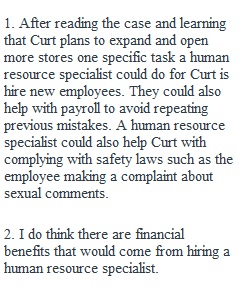


Q Please read the case and answer the questions at the end. Please respond to two of your peers. Do you agree or disagree? Curt's Cowboy Corner is a chain of 15 stores that sells cowboy boots and western clothing. Curt opened the first store 10 years ago in a small Rocky Mountain town and quickly gained a following of loyal customers. Based on input from customers and friends, Curt decided to expand his business and began opening new stores in nearby towns. He plans to open 10 more stores in the next few years. Each of Curt's stores has a manager, three full-time sales representatives, and five or six part-time employees. In the early days, Curt worked closely with each store manager to plan day-to-day operations, helping to make all hiring decisions. He and a secretary also spent many days each month working on payroll. Lately, however, Curt has found that he does not have enough time to interview job candidates and handle several other of his customary tasks. He thinks this might be one reason some of the newer employees aren't working out so well. In addition, last month, he was two days late completing the payroll, thereby creating numerous problems for employees. Curt knows that he needs to do a better job of delegating tasks. Another of his concerns focuses on the potential liabilities of having a growing workforce. One employee recently told him that she felt uncomfortable about some sexual comments her boss had made to her. Curt spent several hours talking to both the employee and her boss, and although he feels pretty good about how he handled the situation, he acknowledges that he does not have the requisite knowledge or skill to resolve such matters. Curt's brother, who owns a number of automobile dealerships in a distant city, has encouraged Curt to hire a human resource professional. But Curt has been reluctant to hire staff members who do not spend time selling in stores. His philosophy has always been those staff members who don't make sales are an expense without much return. At the same time, Curt knows that he must do something, or else things will get worse. If he is able to grow the business as he plans, he will soon have nearly 100 full-time employees. Questions: 1. What are some specific tasks that a human resource specialist could do for Curt? 2. Are there any financial benefits that might come from hiring a human resource specialist? 3. How might labor trends affect Curt's ability to continue expanding his stores? 4. What benefits and problems might result if Curt hires a human resource specialist to provide support to all stores? Would it be better to simply delegate all human resource activities to each store manager?
View Related Questions